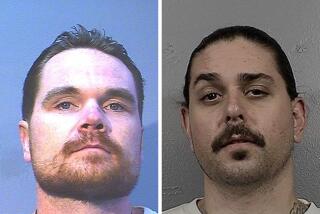Man Given Probation in ‘Unique’ Mercy Killing of Uncle
- Share via
The facts surrounding the 1984 mercy killing of an elderly Pasadena man were “so unique” that he felt compelled to free the accused murderer on probation, a judge said Tuesday.
Pasadena Superior Court Judge Coleman Swart said he sentenced Wallace Cooper to five years’ probation on Monday because Cooper was motivated by compassion and not malice when he injected his terminally ill 81-year-old uncle with a lethal mixture of drugs in September, 1984.
“If there is such a thing as a classic mercy killing case, this is it,” Swart said during an interview in his chambers Tuesday. “There were no ulterior motives. . . . He didn’t do it for any other reason than to put his uncle out of misery.”
Swart also said he believes that a law allowing some form of mercy killing, or euthanasia, would prove unworkable and that the best way to address the ethical and moral complexities in such cases is at the sentencing stage.
“This is too confusing an area of the law to be legislated,” the judge said. “If you legalize euthanasia, you’re asking someone to prejudge whether someone’s life should be taken away. . . . The mechanics of that are impossible.”
Cooper, a 46-year-old physician’s assistant who oversaw the care of his dying uncle, had been charged with first-degree murder. After negotiations with the Los Angeles County district attorney’s office, Cooper pleaded no contest Monday to voluntary manslaughter, which carries a maximum prison sentence of 11 years.
Swart said he did not think freeing Cooper on probation would prompt a flood of mercy killing defenses.
“The facts of this case are so unique that I don’t think this will open the door any,” he said. “What he did is still a crime, still a felony. But some cases of voluntary manslaughter deserve probation.”
Cooper told Los Angeles County sheriff’s homicide detectives that he injected his bedridden uncle, Wallace Goulden, last Sept. 1 with a deadly mixture of morphine and digoxin, a potent drug that slows the heart rate.
Two hours after the injection, Goulden--who suffered from congestive heart failure, kidney failure and fluid in his lungs--died at his Pasadena home with Cooper and other family members at his bedside.
Cooper told authorities that he administered the injection at the behest of his uncle, the man he was named after and regarded almost as a father.
According to court documents, Goulden was in extreme pain and could no longer swallow or move. He pleaded with Cooper and other relatives to end his suffering.
“How many more weary miles are you going to make me travel?” he asked relatives, according to court records.
Swart said a letter written by Goulden’s wife, Elma, in support of Cooper played a important part in his decision to grant probation.
Elma Goulden, the 81-year-old twin sister of Cooper’s mother, called her nephew a “wonderful young man, who loved his uncle dearly.”
“He always put his uncle’s needs ahead of his own needs and he did it with such love and compassion,” Goulden wrote. “My husband was so ill that he could not eat or go to the bathroom. He was in great pain and when I quoted him the 23rd Psalm, he would say, ‘What are you waiting for? When can I go?’ ”
Cooper, who lives in Pasadena with his wife and three children, has worked as a physician’s assistant, providing emergency medical care in rural Alaska and as a volunteer medic with the Israeli army during the 1973 Yom Kippur War. At the time of Goulden’s death, Cooper was enrolled in a one-year training program at County-USC Medical Center.
According to court records, Cooper would often work 12-hour shifts at the medical center and then drive to his uncle’s home to care for him. On Aug. 15, 1984, Goulden’s longtime doctor told family members that Goulden’s heart was failing and that they should make funeral arrangements.
The next two weeks, according to Cooper’s statements to police, Goulden experienced extreme pain and repeatedly begged Cooper to administer enough pain killer to take his life.
Three days before Goulden’s death, Cooper withheld medication that regulated Goulden’s heartbeat, according to a police report. It was only after this “passive” measure failed to end Goulden’s life that Cooper decided to take the “affirmative” step of injecting his uncle with the lethal mixture of drugs.
More to Read
Sign up for Essential California
The most important California stories and recommendations in your inbox every morning.
You may occasionally receive promotional content from the Los Angeles Times.













